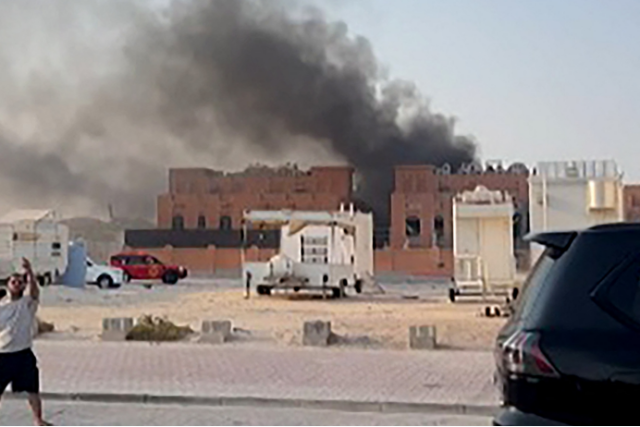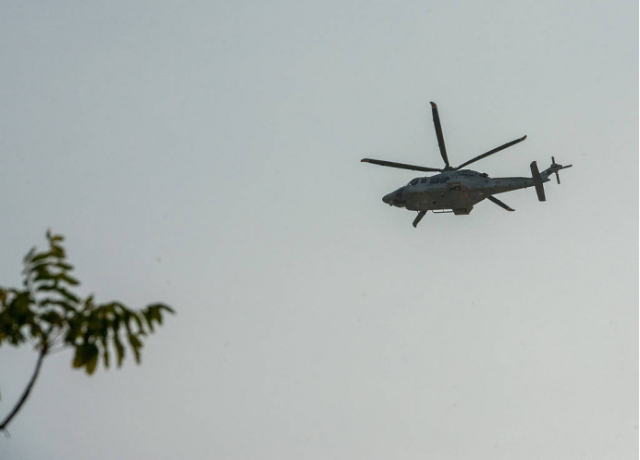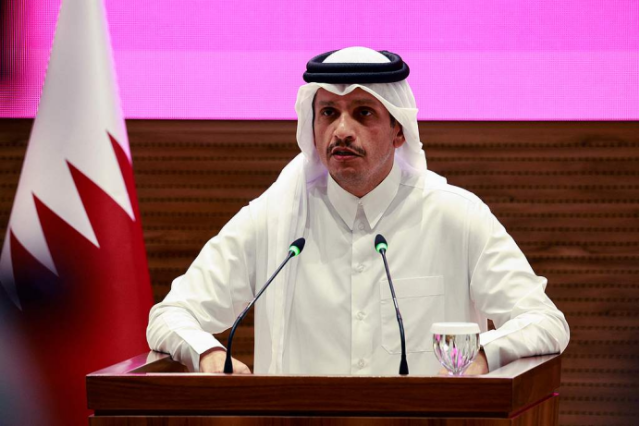On September 9, Israel launched an unprecedented airstrike in Doha, codenamed "Peak of Fire," targeting senior Hamas officials during active ceasefire negotiations. While Hamas sources reported that its leaders survived, several family members and aides were killed. Qatar's Interior Ministry confirmed that one security officer died and others were wounded.
Qatari Foreign Ministry spokesman Majed Al Ansari accused Israeli Prime Minister Benjamin Netanyahu of showing "absolutely no respect for partners and allies," warning that mediators were being scapegoated. Still, he reaffirmed Qatar's commitment to continuing peace efforts.

Smoke billows after explosions in Qatar's capital Doha on September 9, 2025. (Photo: CFP)
Wang Jin of China's Northwest University commented that the operation aimed to "disrupt any potential ceasefire opportunity" and force acceptance of Israeli terms, further undermining the peace process.
A Betrayed and Sidetracked Qatar
As a key mediator in Gaza ceasefire talks and host to Hamas's political office, Qatar condemned the attack as a violation of its sovereignty and international law.
Li Zixin, Assistant Researcher at the China Institute of International Studies, stated that Qatar likely feels "betrayed by the U.S. and Israel." The strike has damaged Qatar's goal of being recognized as a neutral state and enhanced its regional influence, significantly reducing its willingness to dedicate diplomatic and economic resources to mediating peace.

A helicopter is seen flying over the site of the Israeli airstrike in Doha, Qatar on September 09, 2025. (Photo: CFP)
Israeli Prime Minister Benjamin Netanyahu publicly declared the attack a "reckoning for Hamas' atrocities on October 7, 2023," vowing that "architects of the massacre" would not escape justice.
Washington's unspoken role
Reports indicate the Trump administration was informed in advance and provided intelligence support for the strike. Although avoiding public endorsement, the U.S. is seen as strategically aligning with Israel to weaken Hamas and promote a "New Middle East deal" normalizing Arab-Israeli relations.
This dual approach, publicly upholding allies' sovereignty while privately enabling Israeli operations, risks eroding trust among regional partners and undermines Washington's credibility as a security guarantor.
President Trump privately assured Qatar that such operations would not recur and expedited defense cooperation discussions—a move experts view as tactical appeasement. Li warned that "the credibility of U.S. security commitments to its regional allies is now widely questioned." Ultimately, the U.S. remains inclined toward Israel, despite damaging relations with Arab partners.
Middle East suffers increased instability
The strike has heightened instability across the region. Wang Jin noted that despite strong condemnations, Arab states possess limited means to counter Israel. He also pointed out that Israel's "military adventurism" is expanding the conflict from Gaza to the entire Gulf region.
In response, Saudi Arabia deployed additional air defense forces to Qatar, and the UAE suspended some economic and trade cooperation with Israel, signaling heightened regional alert. The international community reacted strongly. UN Secretary-General António Guterres unusually referred to the strike as "aggression," while countries including Iran and Saudi Arabia expressed support for Qatar.

Qatar's Prime Minister and Foreign Minister Mohammed bin Abdulrahman al-Thani addresses a press conference following Israeli strikes in Doha on September 9, 2025. (Photo: CFP)
Mounting pressure prompted U.S. Secretary of State Antony Blinken to call Qatar's Emir, promising to "thoroughly investigate and prevent recurrence," while avoiding mention of Israel's responsibility.
This "camp-based polarization" suggests the Middle East may be returning to an era of proxy wars. More critically, the attack shattered already fragile peace talks. Before the strike, a U.S.-proposed ceasefire had seen Hamas agree to release some hostages in exchange for Israel lifting the blockade on Gaza. Israel's actions rendered compromise meaningless. As Guterres stated, "When the negotiating table becomes a battlefield, peace is already dead."
Reporter: Guo Zedong
Editor: Yuan Zixiang, James Campion, Shen He
















